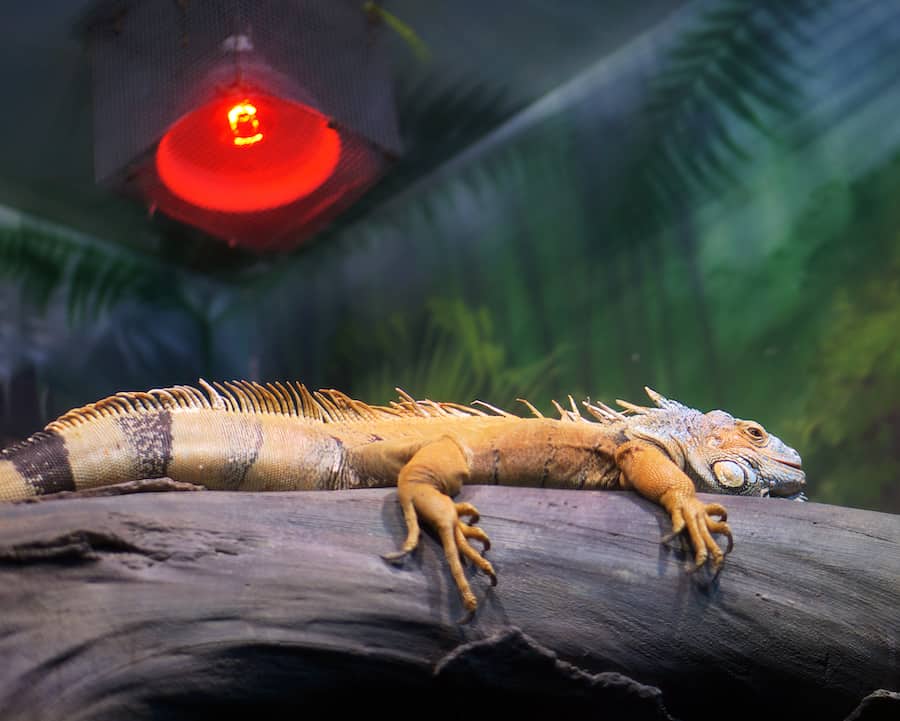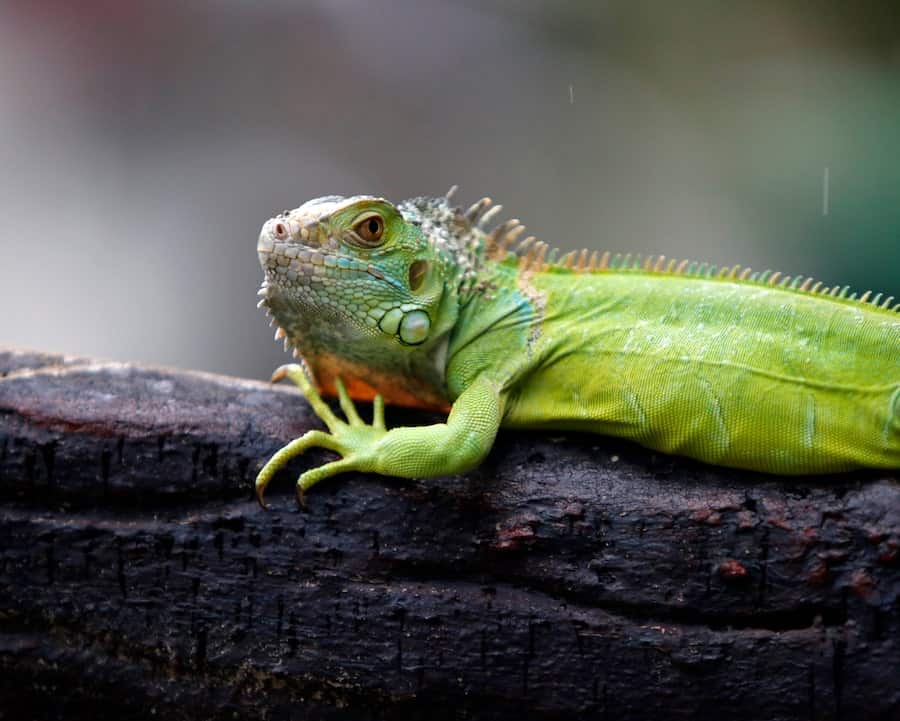Do you plan on owning an iguana or do you already own one? If so, one question you may have is, “are iguanas cold blooded?” It’s a great question that you need to know the answer to as an owner.
Iguanas are cold blooded, also known as ectothermic, which means they have to warm their bodies using an external heat source. Wild iguanas warm their bodies using the sun, but captive iguanas will require a heat lamp. Failure to provide a heat source can lead to digestive complications and death.
In the guide below, I will explain what being cold-blooded means to an iguana, what happens when they get too cold, how to keep them warm, why they fall out of trees and if they can survive in a non-tropical environment.
Are Iguanas Cold Blooded?

Iguanas are reptiles and part of the lizard family, which means that they are cold blooded. Being cold blooded actually gives iguanas a huge advantage when they live in their natural habitats.
Iguanas are naturally found in hot and humid places. If they were warm blooded, like you and I, they would easily overheat in hot weather. But because they’re cold blooded, they can stay cool even when temperatures soar.
The technical term for cold-blooded is ectothermic, and what this means is that iguanas:
- Can’t regulate their own body temperatures
- Have internal body temperatures that are similar to their external environment
That’s why iguanas love to bask in the sun (or under a heat lamp if they’re in captivity). The warmth from the sun heats up their bodies, allowing them to move around, forage for food and digest their food.
What Happens When Iguanas Get Too Cold?
If iguanas can’t regulate their own body temperatures and their internal temperatures are similar to their environment, then what happens when the weather gets cold?
Iguana expert James W. Hatfield explains in his book “Green Iguana The Ultimate Owner’s Manual” that if iguanas had to live in cold weather, they would eventually die.
Now, I don’t want you to think that an iguana will drop dead the moment it gets a little chilly. But eventually, iguanas can die from being in environments that are too cold for them.
When temperatures dip into the 40s (Fahrenheit), iguanas become immobile, or what they call “cold-stunned.” Their bodies become slow and rigid, and eventually, they just stop moving.
I know you’ve heard about the “falling iguana” phenomenon in Florida. That’s exactly what happens to iguanas when it gets too cold. They stop moving, and if they’re up in the trees, they’ll lose their grip and fall.
Some of these iguanas never recover, but many do. As the weather warms up, they “come back to life” and get on with their daily lives.
Now, what about pet iguanas? Hopefully, your pet’s enclosure never gets as cold as 40F. But if temperatures do get a little lower than they should be, you may notice a few signs, such as:
- Lethargy
- Color changes – cold iguanas will darken to try and absorb more heat
If it gets too cold, your pet iguana may stop moving entirely – just like the wild iguanas in Florida.
If your iguana is cold, one of the most obvious physical signs is color changes. I recommend reading my post, “4 Reasons Why Iguanas Turn Black: Solutions Included,” to learn more about these color changes and how to fix the problem.
How to Keep Your Pet Iguana Warm?

For iguanas to live a healthy, happy life, their environment must be at the right temperature. Experts recommend keeping:
- Basking spots at 95°F-100°F
- The rest of the enclosure at 80°F-85°F
I’ve found that the best way to keep a pet iguana warm is to use a heat lamp or basking bulb. Placing your bulbs above the basking spot will help heat the entire enclosure, and it will also make basking feel a little more natural for your iguana.
Just make sure that you have a thermometer in the enclosure to monitor the temperature. It’s important to keep them warm, but you don’t want them to overheat, either.
Iguanas have really specific light, heat and humidity requirements, which is part of the reason why I don’t usually recommend these lizards as pets for beginners.
I recently wrote the post, “Pros & Cons of Owning an Iguana: Is This Pet Right For You?” which sheds some light on some of the more complicated aspects of owning an iguana.
At What Temperature do Iguanas Fall from Trees?
As an iguana owner, it may come as a surprise to you that your agile iguana can fall out of a tree. I remember reading about iguanas falling out of trees in Florida and assuming that they were dead.
However, I found out that these reptiles are often not dead. Instead, their body has slowed down dramatically to conserve energy.
In most cases, you’ll find:
- Iguanas are at risk of brumation when temperatures hit 50°F
- Iguanas can withstand temperatures as low as 40°F, but they’re at great risk of dying if exposure exceeds eight hours
If you want to learn more about iguanas, why they fall out of trees and if they hibernate, I wrote an in-depth guide on the topic titled, “Do Iguanas Hibernate? Why Not & What They Do Instead.”
Can Iguanas Survive in Non-Tropical Environments?
Iguanas are cold blooded, and they’re normally found in tropical climates or the desert. Due to these climate requirements, iguanas are not easy reptiles to care for because you need to mimic these environments in their enclosure.
In non-tropical environments, iguanas can live if they:
- Are cared for by a human and kept in a temperature-controlled environment
- Are outside for short periods of time in non-tropical environments
As you just read, iguanas will fall from trees due to cold temperatures and enter into a hibernation-like state.
If exposed to a non-tropical environment for a long period of time, they may “freeze” as they do in a cold snap in Florida, eat less, become lethargic and even die.
Plenty of iguana owners live in environments where an iguana would die in the wild. I remember when I was growing up, a friend lost his iguana when it snowed, and the reptile didn’t make it.
However, the iguana lived happily for years in the indoor enclosure that my friend made for him and only died because he escaped.

